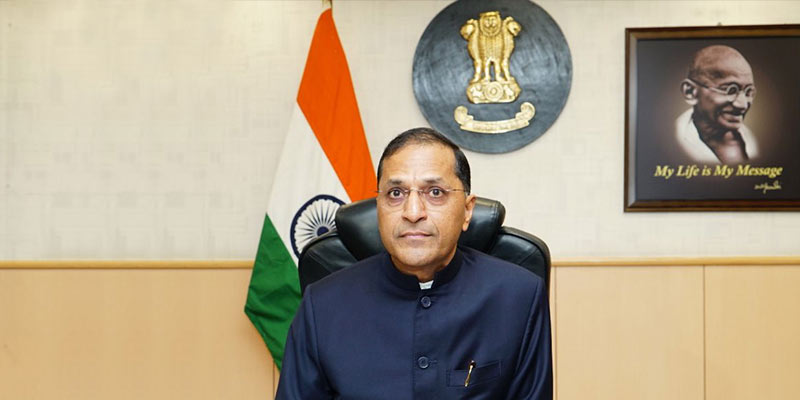- India
- Mar 11
Explainer - Appointment of election commissioners
Days before the expected announcement of the schedule for the 2024 Lok Sabha elections, Election Commissioner Arun Goel resigned.
His tenure was till December 5, 2027.
According to a law ministry notification, Goel's resignation has been accepted by President Droupadi Murmu with effect from March 10.
Goel, a retired bureaucrat, was a 1985-batch IAS officer of the Punjab cadre. He had joined the Election Commission in November 2022.
Following the retirement of Anup Chandra Pandey in February and Goel's resignation, the three-member EC has now only one member: CEC Rajiv Kumar.
New law to regulate appointments of CEC, election commissioners
• On December 28, 2023, the President gave assent to the Chief Election Commissioner and Other Election Commissioners (Appointment, Conditions of Service and Term of Office) Bill, 2023.
• The Chief Election Commissioner and other election commissioners shall be appointed from amongst persons who are holding or have held a post equivalent to the rank of secretary to the government of India and shall be persons of integrity, who have knowledge of and experience in management and conduct of elections.
• A search committee headed by the Minister of Law and Justice and comprising two other members not below the rank of secretary to the government of India, shall prepare a panel of five persons for consideration of the selection committee, for appointment as the Chief Election Commissioner and other election commissioners.
• The Chief Election Commissioner and other election commissioners shall be appointed by the President on the recommendation of a selection committee consisting of:
a) Prime Minister - chairperson
b) Leader of Opposition in the House of the People - member
c) A Union Cabinet Minister to be nominated by the PM - member.
• The Chief Election Commissioner and other election commissioners shall be paid a salary which is equal to the salary of a judge of the Supreme Court.
• The Chief Election Commissioner and other election commissioners shall hold office for a term of six years from the date on which he assumes his office or till he attains the age of 65 years, whichever is earlier.
• The Chief Election Commissioner and other election commissioners shall not be eligible for re-appointment.
• Where an election commissioner is appointed as Chief Election Commissioner, his term of office shall not be more than six years in aggregate as the election commissioner and the Chief Election Commissioner.
• The Chief Election Commissioner shall not be removed from his office except in like manner and on the like grounds as a judge of the Supreme Court.
• The other election commissioners shall not be removed from office except on the recommendation of the Chief Election Commissioner.
• A clause related to protection from initiation of legal proceedings against the Chief Election Commissioner and election commissioners for actions taken while carrying out their duties has also been introduced through the amendments.
Election Commissioners
• The first Chief Election Commissioner (Sukumar Sen) was appointed on March 21, 1950.
• Originally, the commission had only a Chief Election Commissioner. It currently consists of the Chief Election Commissioner and two Election Commissioners.
• Two additional commissioners were first appointed on October 16, 1989, but they had a very short tenure till January 1, 1990. Later, on October 1, 1993, two additional election commissioners were appointed.
• The concept of multi-member Commission has been in operation since 1993, with decision making power by majority vote.
• The Chief Election Commissioner can be removed from office only through impeachment by Parliament.
Election Commission of India
• The Election Commission of India (EC) is a permanent independent constitutional body created under Article 324 of the Indian Constitution.
• The EC was set up on January 25, 1950, on the eve of India becoming a sovereign democratic republic with its headquarters in New Delhi.
• EC is vested with the powers and responsibilities of superintendence, direction and control of the entire process of preparation and revision of electoral rolls for, and conduct of, elections to the houses of Parliament and Legislatures of the states and the Union Territories and of elections to the offices of President and Vice-President.
• Elections are conducted according to the constitutional provisions, supplemented by laws made by Parliament and rules and orders made thereunder. The major laws are:
• The Presidential and Vice-Presidential Elections Act, 1952.
• The Representation of the People Act, 1950.
• The Representation of the People Act, 1951.
• EC prepares, maintains and periodically updates (new registration, modification and deletion as per guidelines) the electoral rolls, registers political parties/candidates, supervises the whole process of conducting election, monitors the election campaigns, including funding and expenditure of candidates, maintaining Model Code of Conduct (MCC) to make the entire electoral process free fair democratic and accessible for all its stakeholders.
• It also facilitates coverage of the election process by the media, carries out the voter education and awareness measures, organises the polling stations/ booths where voting takes place, and oversees under stringent surveillance mechanisms the counting of votes and the declaration of results.
• All political parties are required to get themselves registered with the Election Commission. Based on performance criteria laid down in the Election Symbols (Reservation & Allotment) Order 1968, the EC grants recognition to political parties as national or state parties. It also decides disputes relating to splits/mergers of recognised political parties.
• At the state level, the election work is supervised, subject to overall superintendence, direction and control of the Commission, by the Chief Electoral Officer of the State, who is appointed by the Commission from amongst senior civil servants proposed by the concerned state government. He is, in most of the States, a full time officer and has a small team of supporting staff.
Manorama Yearbook app is now available on Google Play Store and iOS App Store

